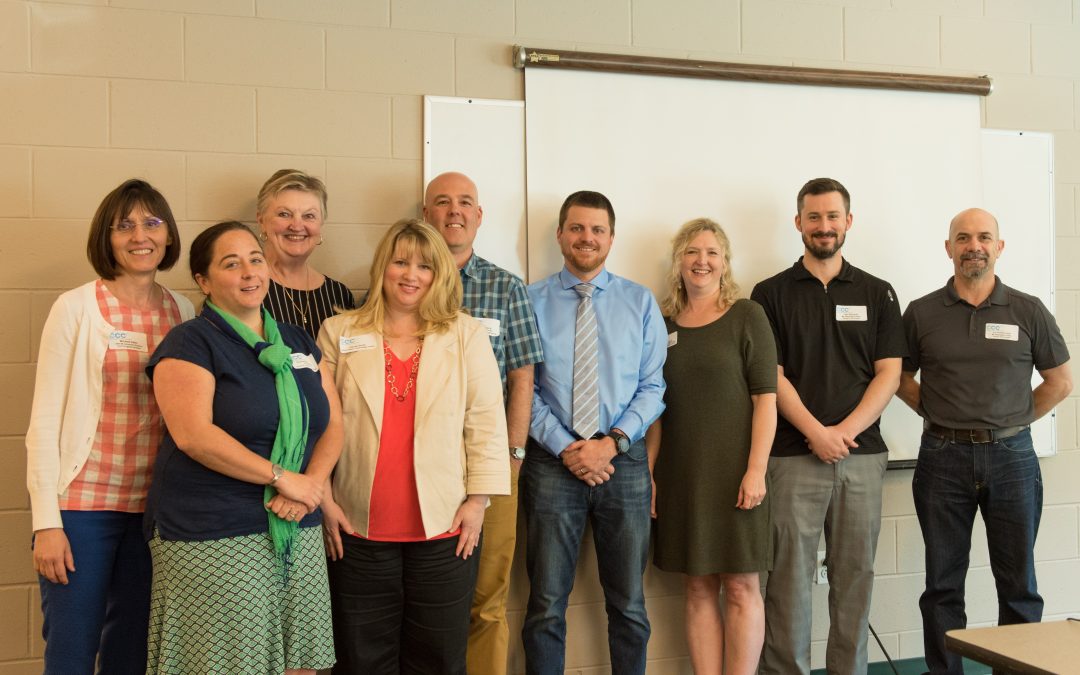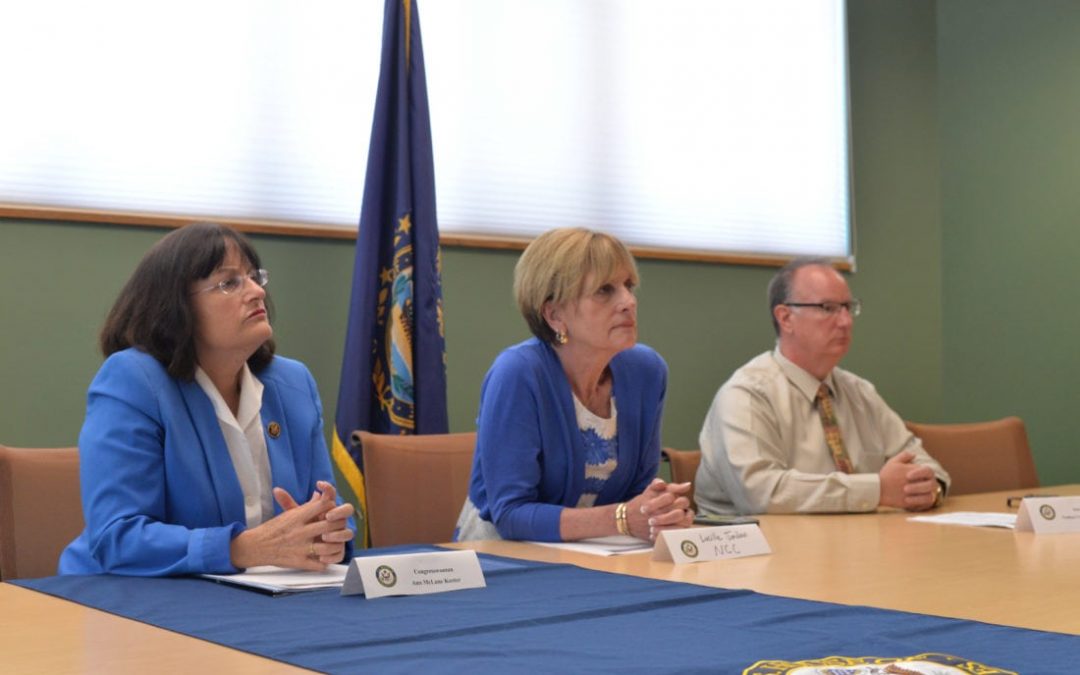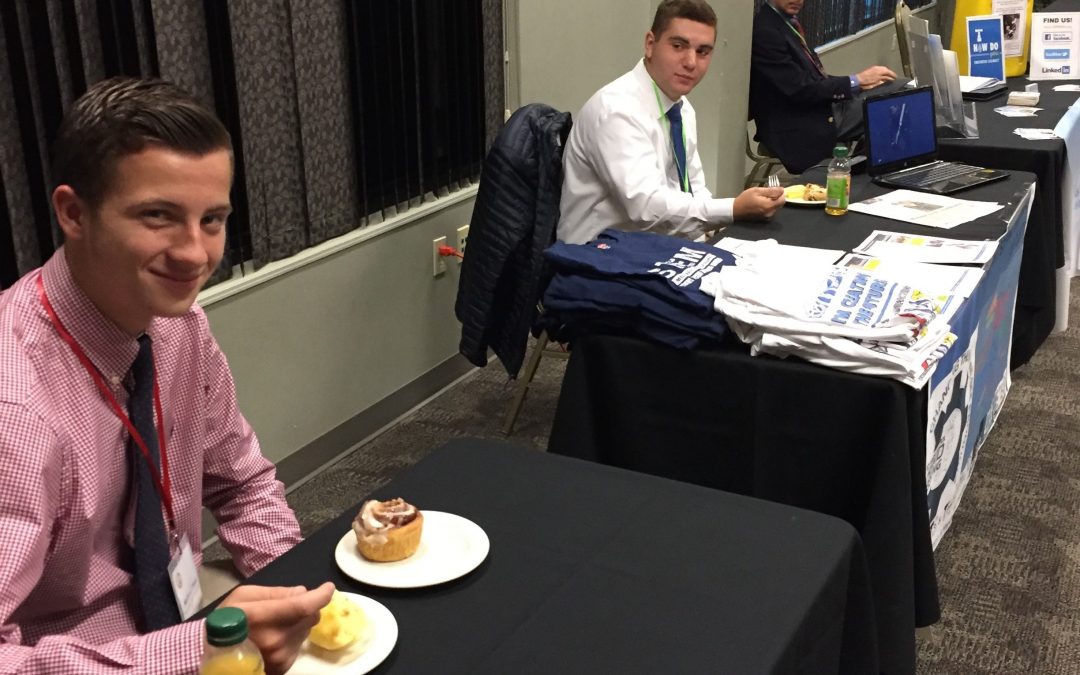
Jun 13, 2018 | Article
Loosely defined as the thought processes involved in formulating problems and expressing solutions in ways that can be carried out by computers, computational thinking is not just relevant for computer science.
This hypothesis has been the basis for Creative Computing Challenge (CCC), a five-year program funded by the National Science Foundation. Its purpose is to help prepare educators in New Hampshire CTE centers and high schools to teach a project-based and personally relevant computing curriculum to 400+ students.
Now in its fifth year, the program has been led by Mihaela Sabin, associate professor of computer science at UNH Manchester, who cited a broader purpose than is realized by even educators themselves.
“We are preparing teachers—whether in business, engineering, graphic design, or photography—to integrate computational thinking practices in their teaching,” she said. “We want to shift the emphasis from teaching students how to use technology tools to how to create and invent with technology.”
In these past 4 years, Sabin said they have refined the curriculum to focus less on learning about specific tools and more on framing the learning experience around what interests students. It is a shift that reflects broader changes in best teaching practices.
“We are shifting from a teacher centered learning environment to one that is student centered,” she said. “You have to ask your students who they are.”
In asking this question, Sabin said teachers put students at the center of the learning environment and give them a voice.
“This is equity-based teaching, so you have to trust the students and allow them to bring their own expertise into the classroom,” she said. “Learners don’t construct their own knowledge in a vacuum. Instead, they get engaged in personally meaningful activities and interact and share with peers to combine their learning experiences with what they already know.”
For today’s students, that means social media and programming platforms like Facebook or App Inventor, which served as the backdrop for CCC curriculum in which app-making was brought into the classroom at eleven New Hampshire schools. At Career and Technical Centers and high schools in Belmont, Concord, Conway, Derry, Dover, Keene, Manchester, Peterborough, Rochester, Salem, and Wolfeboro, students in classes from photography and business to cosmetology learned how to write apps. In addition to games, these apps included community projects, how to run an online store, assess developmental milestones in preschool children, and more.
“Teachers were impressed at how inventive and persistent the students were,” said Sabin.
Other CCC components have included a summer camp for girls, several intensive professional development summer institutes and school year workshops for teachers, and a Cooperative Extension STEM Docents Program for volunteers and K-12 educators to further sustain CCC curricula and learning activities.
One of the primary long-term objectives is to build teacher capacity long after funding for the program has been exhausted. Sabin also cited laying a strong bridge between education and industry.
“This is competency-based education where it is not just about knowing concepts and disciplinary content, but rather what students do with what they know,” she said. “When we focus on competencies, we bridge the disconnect between education, career readiness, and industry to make sure what is happening in the classroom is more connected to professional expectations.”
This work is supported by grant #IIA-1348352 from the National Science Foundation.
This is the first part of a multi-part series on CCC and the relevance of computational thinking in the classroom and industry in NH.

Jun 12, 2018 | Article
Should a business owner ever turn down work? If you own a business in what is broadly referred to as “the trades,” the answer is probably yes, which Al Lawrence, owner of Artisan Electric in Madbury, NH, says only tells part of the story.
The building industry is struggling because we have paid so little attention to the need for workers that we are all starting to really feel the pain,” he said. “We are turning down work because we cannot met the demand. We just don’t have qualified personnel to do it.”
According to Lawrence, though, there are no simple solutions to this problem, as he noted many secondary students today are still not aware of Career and Technical Education (CTE) in the state. CTE is defined as hands-on, real-world learning that applies directly to a job or career.
“It’s offered at high schools across the state, but there is still a misunderstanding about the jobs that result from this education,” he said. “These are jobs in the building industry, health care, finance, automotive and other industries—it’s more diverse than people realize.”
He said what people also do not realize is the rate of pay associated with jobs that open up fairly quickly for students who have availed themselves of CTE while in high school.
“A couple years ago, I might start someone out at $10/hour with a plan to get to $20/hr in 4 years, whereas now it is more likely they will reach $25 or $30/hour in that same time frame,” he explained. “These types of wages are comparing with a lot of so-called professional careers. These are lost opportunities for today’s students.”
Describing an “upward pressure” that is forcing business owners like him to rapidly increase wages to entice prospective job applicants, Lawrence said he is “really concerned” at what is described as “the graying of NH.”
“The average age of an electrician is over 50 in this state,” he said. “Do you think these people are all going to be pulling wires until they are 70? I don’t think so.”
The solution, according to Lawrence, is to not just promote more heavily the opportunities that currently exist in CTE, although he said that is a start.
“That’s why I’m involved with SkillsUSA New Hampshire,”said Lawrence, who also serves as treasurer. “I try to go out as much as I can to talk to kids about the opportunities in my industry and the business side of things…As an industry, we need to be out there.”
He said the solution, however, is much more complicated that putting together advertising campaigns. In short, he cited a gap in middle or soft skills.
“People think about the technical skills with my industry, and there is truth to their importance,” he said. “However, this is part of an old paradigm that is started to change. “Soft skills like communication, the ability to work on a team, and showing up on time—these are the skills we really need today and we have always needed.”
“To some extent, I can teach anyone how to wire a building,” added Lawrence, but I can’t teach you how to be a friendly person, treat people with respect or instill a desire to problem solve.”
According to Lawrence, though,one of the most important aspects of the current employment shortage is something people do not talk about enough in industry or at all.
“What does success look like,” he said. “What does a modern career look like? We need to change our paradigm of what that looks like. I need to change, too. We need to make sure we put first things first.”
This is the first in an ongoing series of articles with Lawrence and other business owners on the employment gap, the importance of CTE and other related issues.

May 31, 2018 | Arts, A/V Technology & Communication, Film/Video & Photographic Arts, Other, Programs, Radio & Television Broadcasting Technology, Tid Bits
Advance CTE’s annual Excellence in Action award recognizes and honors superior Career Technical Education (CTE) programs of study from across the nation. Selected programs of study will exemplify excellence in the implementation of the Career Clusters, show a true progression from secondary to postsecondary education, provide meaningful work-based learning opportunities, and have a substantial and evidence-based impact on student achievement and success.
Nashua Technology Center South is the 2018 nationwide winner for the Arts, A/V Technology & Communication Career Cluster. The program is the result of a school responding to the needs of its students. A survey revealed that students had a significant interest in the TV and Video Broadcasting Career Pathway. After a few years of planning with industry and education partners in the community, the Video Production & Broadcasting program was established in 2001. All students learn the basic foundation of media skills, from field to studio production. To support success in both career and college, learners earn a user certification in Avid Media Composer editing software and up to three college credits through the New Hampshire Community College system. Read More

May 31, 2018 | Article, CTE Promotion
Representative Annie Kuster recently released a plan she terms the “Jobs and Opportunity Agenda.” Kuster highlighted the state’s relatively low jobless rate, saying the challenge now is to provide New Hampshire students the training they need to attain employment.
“We have the jobs and we’re looking for people with the skills to fill those jobs,” is how U.S. Rep. Annie Kuster, D-N.H., describes the Granite State’s economy.
Nashua CTE Director, Amanda Bastoni, was on hand commenting “CTE is not your parent’s vocational program: it’s not where we put the ‘other kids.’ It’s really a true college or career pathway. If we can partner with industry to bring speakers in to do on-the-job training, to do summer classes to give kids those experiences, the research says they’ll make choices that we’re looking for with career and college,” Bastoni said. Full Article

May 6, 2018 | Article
Reflecting its mission “to provide education, leadership, and support for the profession of Engineering across all disciplines of practice,” the New Hampshire Joint Engineering Societies (NHJES) is inviting students to its annual fall conference in October.
NHJES is made up of organizations such as; Structural Engineers of New Hampshire (SENH), Society of Women Engineers (SWE), American Council of Engineering Companies (ACEC), Institute of Electrical and Electronics Engineers (IEEE), and many more.
According to NHJES Board Member Frank Xydias, engineering instructor at Milford High School & Applied Technology Center in Milford, participation in the conference will provide students with a unique opportunity.
“It is not often that high school students have the opportunity to attend a professional workshop and present their concepts in a real-world application,” he said.
This year’s invitation follows a similar one for last year’s conference in which Milford students attended workshops and breakout sessions. In addition, students Matthew Chase and Nikolas Liamos brought their prosthetic bike project to showcase at the 2017 NHJES conference.
One change this year, however, is that the invitation is statewide and open to 12 different STEAM/STEAM groups. Xydias noted the grand vision for this year is to host 12 different groups that include 3 students and 1 teacher from the following groups: PLTW, VEX Robotics, US First Robotics, DOT TRAC, Young Inventors, or others. At this event, they will set up a table display with their projects.
“It is important for students to see the natural progression from interest to career and ways to support those careers through professional networks,” he said.
At the conference, high school students will also be able to learn about current technology and trends happening in industry.
“We ultimately hope these high school students will become members of NHJES or other professional organizations so they can give back in ways they received,” said Xydias. “We want them to see the value in collaboration and on-going training and education.”
He said there is also an immediate experiential learning component for students who attend the conference.
“Matthew and Nik arrived on-time at last year’s conference and ready to work,” he said. “In professional collars, shirt and tie, they greeted passers-by and talked about their project. It was the type of environment that challenged them to think about “why” and answer common questions about it, which is exactly what they will encounter in the engineering design process…It was a ‘text book’ idea board of sharing, but we were not in a classroom.”
These real world tests, noted Xydias provide students with valuable, potentially life-changing insight(s).
“Professional networking is a big part of this and other industries,” he said. “This conference can provide budding engineers with an inside glimpse into this world, a chance to talk to veteran engineers and learn from people in the industry today.”
To learn more about the conference, which takes place on October 9 in Concord and is supported by numerous sponsors who are donating space to students, visit https://docs.google.com/document/d/1ZljhkSLKJYNw-sPMYnqC2H5gzLYS2PzCvK_1KiecNQE/edit.
To sign up, click https://goo.gl/forms/aUIWi1S3HFldPzjk2.





